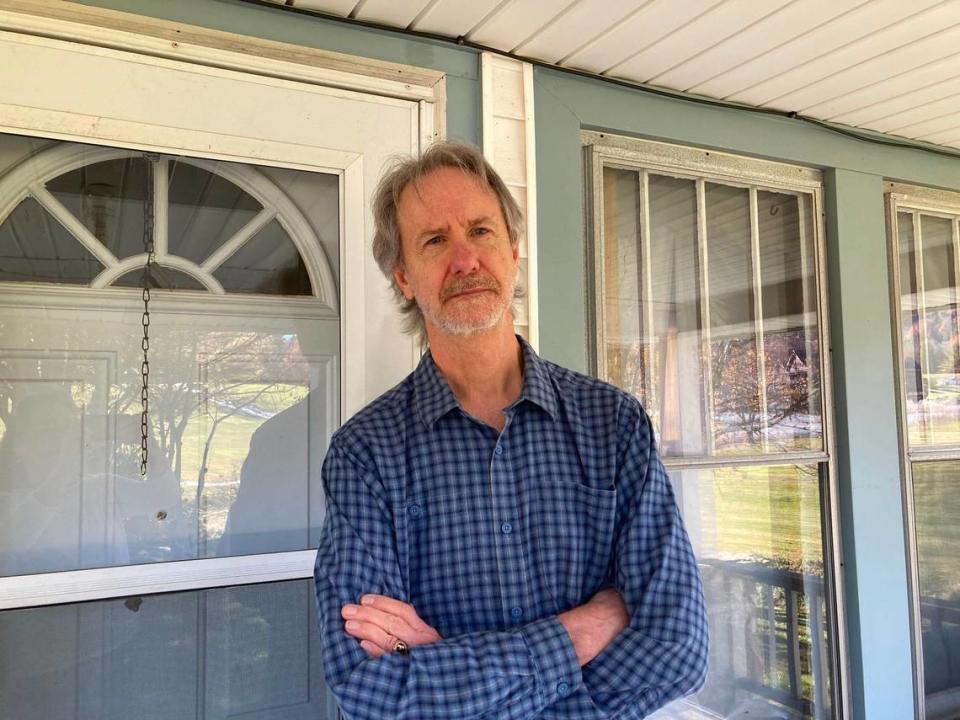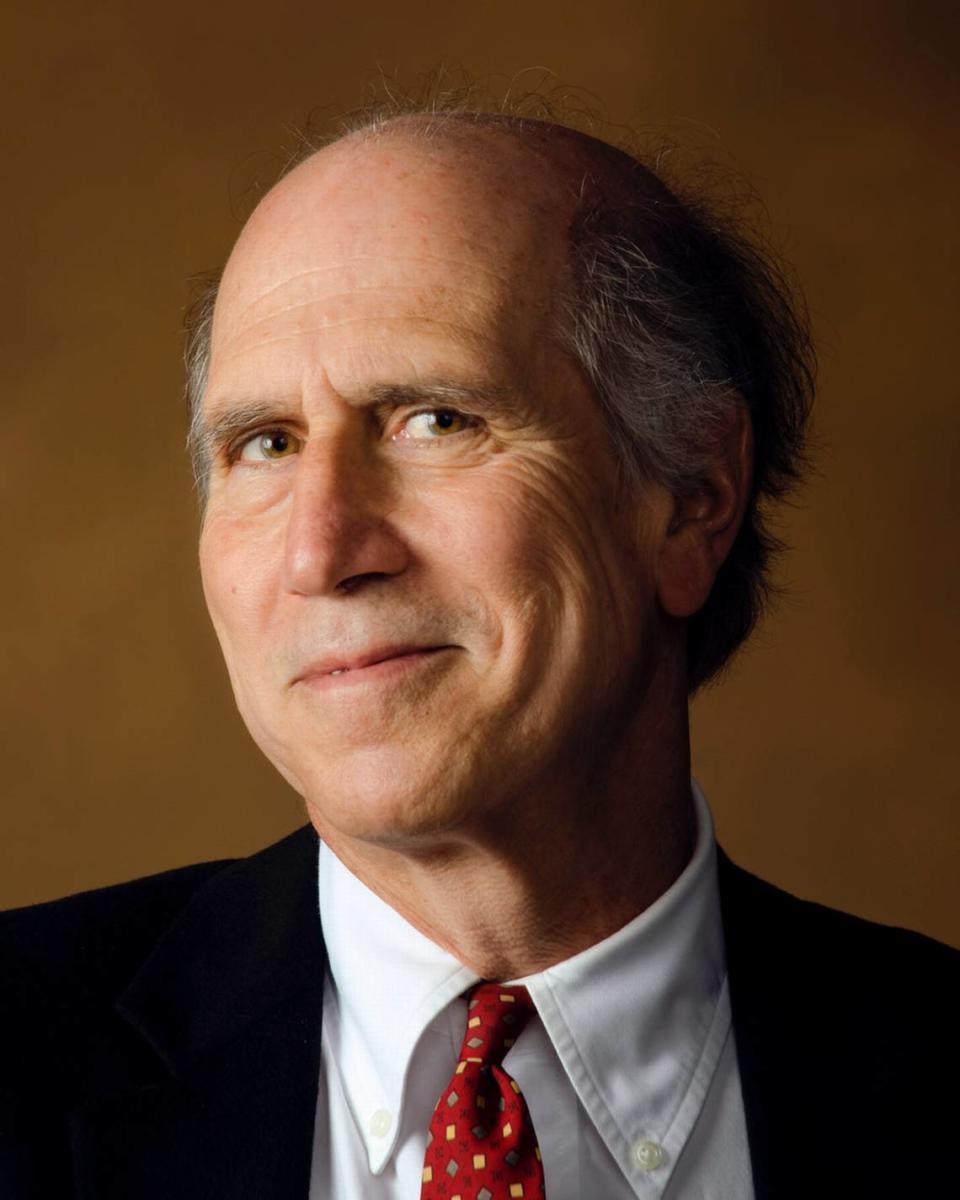2 of NC’s favorite authors reveal the joys, challenges and secrets of great writing
- Oops!Something went wrong.Please try again later.
- Oops!Something went wrong.Please try again later.
We’re rolling in literary riches this fall — a new book by each of two North Carolina favorites — Ron Rash and Joseph Bathanti.
“The Caretaker” (Doubleday, $28) is Rash’s eighth novel and his 20th book.
“The Act of Contrition” (Eastover Press, $19.99) is Bathanti’s second collection of linked stories that continue the adventures of Fritz Sweeney. It’s also his 20th book.
And in yet another coincidence, each writer turned 70 this year — Bathanti on July 20 and Rash on Sept. 25.
Both have long and prestigious academic titles — Bathanti at Appalachian State in Boone and Rash at Western Carolina in Cullowhee. Bathanti was N.C. Poet Laureate 2012-2014, and Rash was a PEN-Faulkner finalist for his bestselling 2008 novel “Serena.”
Rash grew up in Boiling Springs, and he sets his latest in the mid-1950s in and around Blowing Rock. Bathanti grew up in an Italian-American neighborhood in Pittsburgh, and that’s where he sets these mid-‘50s to mid-‘70s stories.

Start with Rash’s “The Caretaker,” and allow yourself a one-sitting read. Here, you’ll meet Blackburn Gant, stricken with childhood polio and shunned by most of his peers. Gant has taken on the role of resident caretaker for a hilltop cemetery, where he lives mostly solo among the dead, keeping immaculate graves. But when his best friend, Jacob Hampton, is drafted into the Korean War, Gant also consents to be the caretaker of Jacob’s pregnant wife Naomi. Jacob’s parents loathe the beautiful but backwoods Naomi and disinherit their only child for marrying down. With Jacob due home from Korea soon, they hatch a ghastly plot — it will shock even the most conniving parents — to end Jacob’s marriage.
It’s Rash at his best, showing us the roiling, destructive underside of what we pretend is love — and how we can delude ourselves into believing that our acts of brutal selfishness are really acts of devotion.
‘The Act of Contrition’
“The Caretaker” is full of triangles, and there’s a dandy one in Bathanti’s “The Act of Contrition.” It’s the boy Fritz and his outrageous, made-for-TV parents, Travis and Rita. In one exquisite story after another, you might fall on the floor laughing or feel a sob trying its best to strangle you.
Travis and Rita work nights in restaurants, sleep most of the day. Fritz gets himself off to school, attends Mass by himself on Sundays. Says Fritz: “My mother was always on the verge of slipping away … often for weeks at a time when she would walk silently, like a sleepwalker, past my father and me, refusing to look at or speak to us, as if we were invisible.”
His dad, Travis, does all the cooking and leaves Fritz’s supper on the stove under aluminum foil. Fritz appreciates his dad’s “resigned bemused detachment, as if he had gauged the underbelly of human nature so flawlessly, that to despise people for being assholes was like despising a bee for having a stinger.”
Bathanti captures a family, a town, its population, its food, its dogs, its sidewalks, its beefs, and its raptures. If we were dropped down in East Liberty, we’d know exactly where to go for bread.

Bathanti, Rash Q and A
Now listen as these two writers discuss talent, writer’s slump and ambition as it relates to the writer’s trade.
QUESTION: What significance does turning 70 hold for you?
BATHANTI: It’s not so much at all how I feel – I feel strong – but that seven followed by that zero is a bit of a freaker, only because when I was a kid, 70-year-olds were finished. They sat on the porch and waved at traffic. And there’s Simon and Garfunkel’s song, “Old Friends,” and the line, “… how terribly strange to be 70.” And it is strange, but I’m OK with strange.
RASH: It’s a time for reflection and gratitude.
Q. What is the most important thing you teach your students about writing?
BATHANTI: I try not to over-mystify the craft of writing. It should be treated as a blue-collar enterprise: It’s work and it doesn’t get done unless you show up habitually at your table. I also harp that they need to read, read, read. For writers, reading is like an athlete watching game films. You have to have practiced, published writers to mimic, and influence you, until you discover your own voice.
RASH: To be a good writer requires a huge amount of reading those who have come before you.
Q. How important is talent?
BATHANTI: That’s a tricky one. We hear — about so many things — that talent can’t be taught, and I guess I agree. But I think that zeal, sheer desire, can sometimes lead to talent or at least a kind of facility. But what a gift – to have raw talent. Perhaps desire is more important than talent.
RASH: Talent is important, but often talent cannot be fully revealed until an immense amount of effort has been put forth first. Too many potentially good writers give up too soon.
Q. Do you have a writing ritual?
BATHANTI: There was a time when I did, but once Joan and I had children, and my life as a teacher and writer became dramatically more intense — so much more time-consuming —I had to find ways to integrate my writing into the seams between my sacred familial obligations and my professional obligations. I still dream about romantic mornings in my cozy, quiet, book-lined study with coffee and the dog at my feet. But it’s all much messier than that — still joyous —and I get it done.
RASH: Yes. I like writing in the morning or early afternoon, a 32 ounce cup of iced tea, pad, pencils, laptop always in the same place.
Q. What is your favorite piece of advice about writing?
BATHANTI: Robert Frost: “No tears in the writer, no tears in the reader. No surprise in the writer, no surprise in the reader.”
RASH: Cliched writing is cliched thought. Martin Amis.
Q. You both have taught at the college level for many years. Is there another occupation that would be as compatible with writing?
BATHANTI: In truth — coming up on 47 years of teaching — I cannot imagine another occupation so nurturing to a writer. In my profession, I’m expected to be a writer. It’s not looked on as an aberration, and I’m habitually among like-minded folks. It’s pretty dreamy, actually. I’ve been incredibly lucky.
RASH: Fire tower spotter in national forest.
Q. Do you believe in writer’s block or in writer’s slump?
BATHANTI: I don’t believe in writer’s block, but of course a writer can slump, in the same vein that great hitters — like Lou Gehrig or Tony Gwynn — can inexplicably slump. You have to keep showing up and keep swinging.
RASH: I do, though I’ve been fortunate in avoiding the block part.
Q. Do you ever write badly? And do you know when you do?
BATHANTI: I often write badly and that’s really OK. One of the true blessings of having written, and having taught writing, for nearly a half century, and having been an editor and rabid reader, is that I’ve developed a sense of objectivity about my work. I know when things aren’t working, even if how to fix it isn’t immediately apparent. I keep returning to the table until I get it right, and I do not let go of it until I get it right – or as right as I can get it. Again, there’s no writing, only rewriting.
RASH: Alas, all too often, especially in this last novel, I’ve written badly, which is why I do so many drafts. (Over 20 for my new novel). I wrote over a thousand pages before I had the final 256 pages.
Q. What has been the role of ambition in your writing career?
BATHANTI: Ambition in the sense that I began burning to be a writer, probably much earlier in my life than I consciously realize, but it became a conflagration once I reached North Carolina in 1976 and actually began writing every day, rather than just dreaming of being a writer. I engaged in what Flannery calls “the habit of being.” I began to practice — the way an athlete or a musician practices — because I wanted to get better and because I wanted to be a writer so badly.
RASH: I’ve always been driven when I attempt to do something well — in high school and college running track, later as a writer — obsessively so. There is a competitive aspect to this, but ultimately a competition with myself — did I write as well and as honestly as I could with whatever ability I have.
Want to go?
Who: Joseph Bathanti
What: Reads from his new book
When: 6:30 p.m. Oct. 11.
Where: Park Road Books, 4139 Park Road, Charlotte
